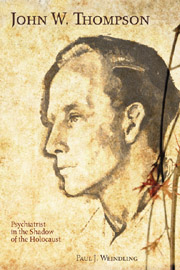
- Publisher:
- Boydell & Brewer
- Online publication date:
- September 2012
- Print publication year:
- 2010
- Online ISBN:
- 9781580467629
- Subjects:
- History, History of Medicine
Our systems are now restored following recent technical disruption, and we’re working hard to catch up on publishing. We apologise for the inconvenience caused. Find out more: https://www.cambridge.org/universitypress/about-us/news-and-blogs/cambridge-university-press-publishing-update-following-technical-disruption

'John W. Thompson: Psychiatrist in Shadow of the Holocaust' is the biography of a doctor whose revulsion at Nazi human experiments prompted him to seek a humane basis for physician-patient relations. As a military scientific intelligence officer in 1945, Thompson was the first to name "medical war crimes" as a special category for prosecution. His investigations laid the groundwork for the Nuremberg medical trials and for the novel idea of 'informed consent.' Yet, Thompson has remained a little-known figure, despite his many scientific, literary, and religious connections. This book traces Thompson's life from his birth in Mexico, through his studies at Stanford, Edinburgh, and Harvard, and his service in the Canadian Air Force. It reconstructs his therapeutic work with Unesco in Germany and his time as a Civil Rights activist in New York, where he developed his concept of holistic medicine. Thompson was close to authors like Auden and Spender and inspirational religious figures like Jean Vanier, founder of L'Arche. He drew on ideas of Freud, Jung, and Buber. The philosophical and religious dimensions of Thompson's response to Holocaust victims' suffering are key to this study, which cites accounts of psychiatrists, students and patients who knew Thompson personally, war crimes prosecution records, and unpublished personal papers. Paul Weindling is Wellcome Trust Research Professor at the Centre for Health, Medicine and Society: Past and Present, Oxford Brookes University, UK.
Almost singlehandedly, Thompson initiated a new Nuremberg Trial targeted specifically at German doctors accused of Medical War Crimes. Author Weindling traces in minute detail how an aroused Thompson overcame resistance in high Allied military and diplomatic circles (a few sought only practical results from those experiments without considering ethics). Thompson would have none of that. He and his adherents informed the public about monstrous experiments undertaken not only by the SS but also by civilian doctors. Those trials duly took place in 1947, thereby establishing an incontestable record of what had transpired in German camps, hospitals, and sanatoria . [An] exhaustive study.'
Source: Journal of the History of Medical and Allied Sciences
 Loading metrics...
Loading metrics...
* Views captured on Cambridge Core between #date#. This data will be updated every 24 hours.
Usage data cannot currently be displayed.